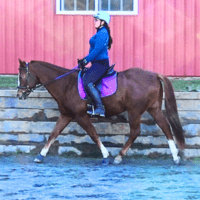Have you ever noticed how horses seem to be always standing, always awake? Well, it might surprise you to learn that horses, just like you, need sleep to stay healthy. According to Kentucky Equine Research, horses actually need about 5-7 hours of sleep every day. Understanding how horses sleep is important for their health and care. In this blog post, we’re going to explain the unique sleep habits of horses.
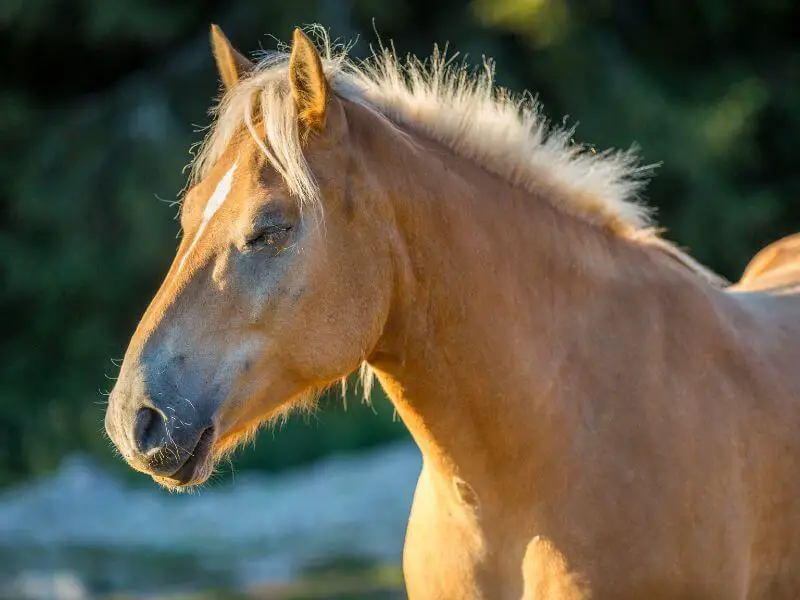
How Do Horses Sleep?
Horse Sleep Patterns
Horses have a unique way of sleeping compared to humans and other mammals. They sleep in short periods spread throughout the day and night, instead of one long sleep. This is a trait that helps them stay alert for potential dangers.
Different Ways Horses Sleep
Horses can sleep in different positions. They can sleep standing up or lying down. When a horse is standing and sleeping, it’s due to a special locking system in their legs known as the “stay apparatus”. This feature helps them to stand safely even when they are not fully awake. They can also lie on their side or on their bellies with their legs tucked under them.
The Sleep Cycle of Horses
Horses go through different stages when they sleep. These stages are:
- Wakefulness
- Drowsiness
- Slow Wave Sleep (SWS)
- Rapid Eye Movement (REM) Sleep
In the SWS stage, horses can either stand or lie on their bellies. Their brain waves slow down, and the brain is less active. During the REM sleep stage, horses lie on their side and their brain waves become rapid and irregular. You might even see them twitch their ears, blink, or move their legs as if they were running.
How Long Do Horses Sleep?
Horses sleep for about five to seven hours a day. The time they spend lying down, in REM sleep, is usually about 2-3 hours per day. This time is crucial for their health.
Changes in Sleep Patterns
The sleep habits of horses can change as they grow older. Young horses or foals sleep a lot more than mature horses, often taking frequent naps throughout the day. As they grow older, horses tend to sleep more while standing up.
Factors Affecting Horse Sleep
A horse’s sleep can be affected by many things like their environment, diet, temperature, workload, and even their social group. Any changes in these areas can disrupt their sleep and impact their health. So, it’s important to make sure they have a safe and comfortable place to rest.
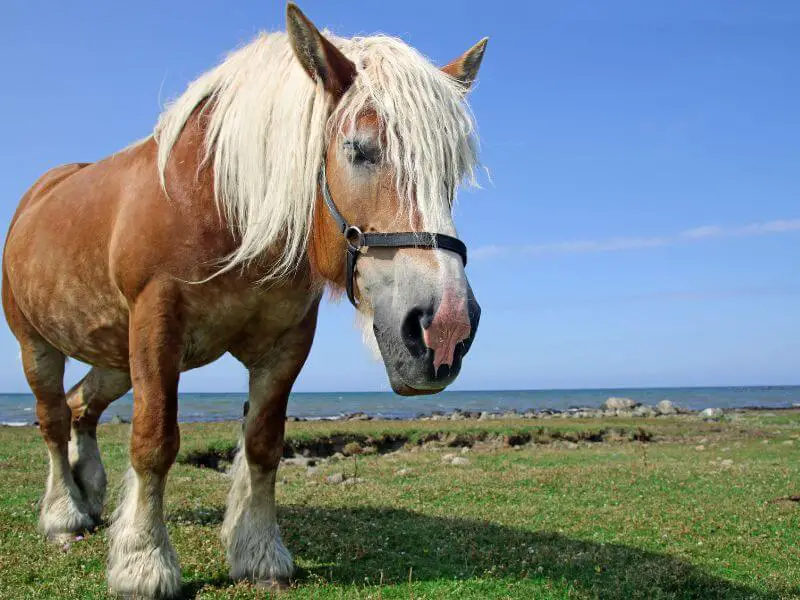
Sleeping Positions of Horses
Horses are known for their unique sleep patterns. They can sleep standing up or lying down. How do they do that? Let’s break it down.
Horses have unique ways of sleeping. They can sleep while standing up, and they also sleep lying down. Here, we’ll talk about common sleeping positions of horses and how foals, or young horses, differ from adults in their sleep habits.
Standing Sleep
One amazing thing about horses is that they can sleep while standing. This is possible because of a special body feature called the stay apparatus. It helps them lock their leg joints and relax their muscles. This way, they can rest while still being ready to move if they need to.
When horses sleep standing up, it’s more like dozing. They close their eyes, relax their ears, and their lower lip may droop.
Lying Down Sleep
Horses don’t only sleep standing up, though. They also lie down to sleep. Here are two common positions they use when they do this:
1. Sternal Recumbency
This is when a horse sleeps lying on its chest. Its legs are tucked under its body and its head and neck are off the ground. This position is common when horses sleep in their stalls.
2. Lateral Recumbency
In this position, horses sleep lying on their sides with their legs stretched out. This is when they get their deepest sleep, kind of like our REM sleep.
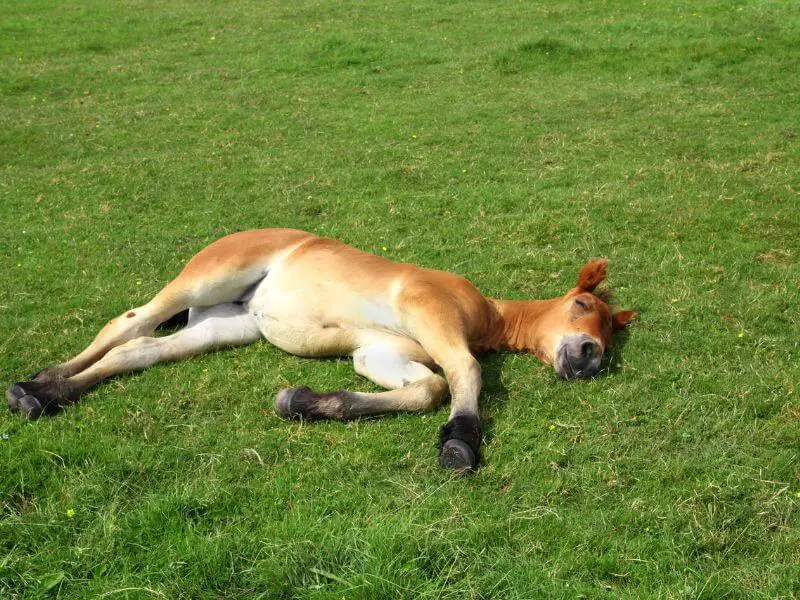
Difference In Sleep Between Foals and Adult Horses
Foals are young horses, and they sleep a lot more than grown-up horses do. When they’re first born, foals sleep about half the day! They do a lot of their sleeping lying down.
As they get older, though, foals sleep less and less, and by the time they’re about seven months old, they sleep more like adult horses do.
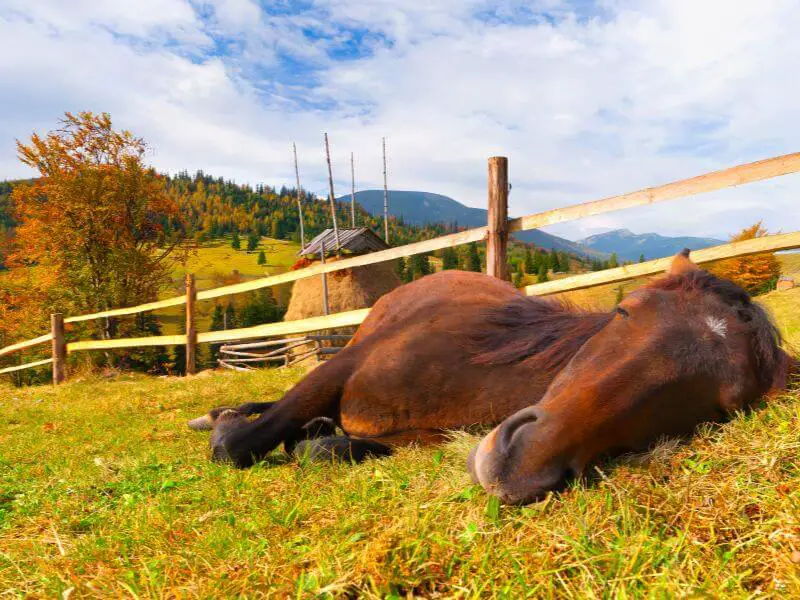
Understanding REM Sleep in Horses
The process of sleep in horses involves several stages, with Rapid Eye Movement (REM) sleep being one of the most important. This stage is similar to what humans experience during a good night’s rest. Let’s learn why REM sleep is so crucial for horses and why they need to lie down to experience it.
Why is REM Sleep Important for Horses?
REM sleep is essential for a horse’s overall health and well-being. During this phase, horses get the deepest, most restful sleep. This deep sleep helps their brains to function correctly, helping to consolidate memories and regulate emotions.
In terms of time, REM sleep should ideally make up around 15% of a horse’s total sleep time. Some horses might get up to 2-3 hours of REM sleep every day, but all horses need at least 30 minutes of REM sleep.
Why Do Horses Need to Lie Down for REM Sleep?
To achieve this vital REM sleep, horses must lie down. But why is that?
When a horse enters REM sleep, it needs to relax all its muscles. This full relaxation can’t happen when they are standing. Horses can doze off while standing, but this type of sleep is light and doesn’t meet the requirements of REM sleep.
To enter true REM sleep, horses must lie down. They usually do this on their side, a position known as lateral recumbency. This position lets horses reach the deepest stages of REM sleep.
During REM sleep, you might notice your horse showing signs like twitching ears or skin, blinking rapidly, flaring nostrils, or moving their legs as if running.
Making Sure Your Horse Gets Enough REM Sleep
Because REM sleep is so important for horses, it’s essential they have a safe and comfortable place to lie down. This might be a sheltered area like a run-in shed, or a roomy stall where they can stretch out safely.
While we still need more research to fully understand REM sleep in horses, we know it’s crucial for their health. By understanding and meeting their sleep needs, we can help our horses live healthier and happier lives.
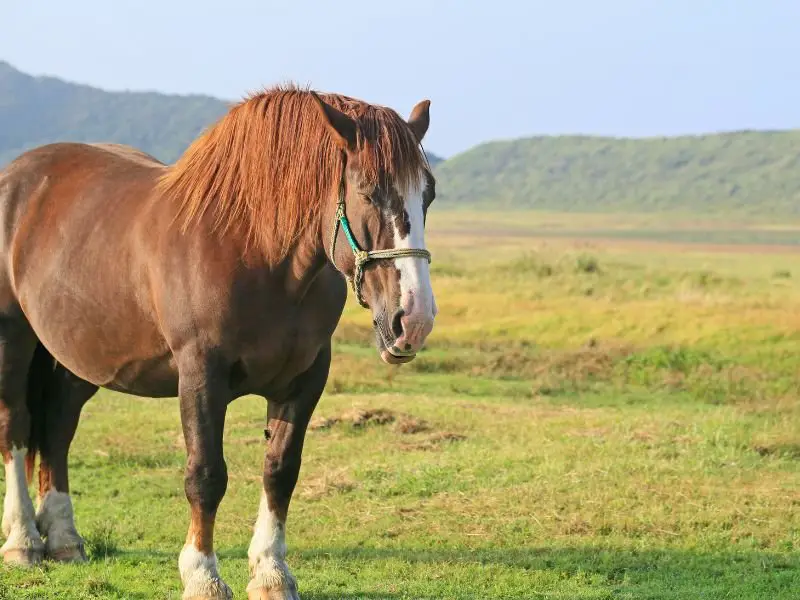
Signs of Sleep Deprivation in Horses
One of the main things to look out for in sleep-deprived horses is excessive daytime drowsiness. When a horse isn’t getting enough sleep, it will often seem very tired during the day.
Another common sign is sleeping at unusual times. If you notice a horse is sleeping more during the day than at night, or at times when they usually don’t sleep, it could be because they’re not getting enough sleep overall.
A horse’s performance can also take a hit from sleep deprivation. You might notice a decrease in the horse’s athletic abilities or overall energy level.
Sleep deprivation can also lead to soreness in the horse’s legs or feet. This can happen because the horse is standing more than usual and not resting properly.
In more serious cases, horses may even have episodes of collapsing due to exhaustion.
Recognizing Sleep Deprivation in Horses
Recognizing these signs early is very important. If you see any of these symptoms in your horse, it could be because they’re not getting enough sleep.
Remember, every horse is different, and what’s normal for one horse might not be normal for another.
If you’re not sure, the best thing to do is to consult a professional, like a veterinarian. They can help you understand what’s going on with your horse and suggest possible solutions.
Common Signs of Sleep Disorders in Horses
Just like sleep deprivation, sleep disorders can also have noticeable signs.
- Excessive daytime drowsiness: This is similar to the sign in sleep-deprived horses.
- Injuries on knees or legs: A horse with a sleep disorder might have scratches or scars on their legs. This can happen because they’re having trouble sleeping and might collapse, hurting themselves.
- Impaired athletic performance: Horses with sleep disorders might also show a decline in their performance or energy levels.
- Reluctance or inability to lie down: If a horse is having difficulty lying down, it could be because of a sleep disorder.
These are just some of the signs to look out for in horses. If you see any of these signs, you should consult a veterinarian. They can help diagnose the sleep disorder and suggest treatment options.
Remember, when it comes to sleep, every horse is unique. Understanding how your horse sleeps and what is normal for them is the first step in ensuring they’re healthy and happy.
Risks of Inadequate Sleep
Not getting enough sleep can cause problems for horses, just like it can for humans. It’s a little like when you’ve stayed up late studying for a test and then feel groggy and slow the next day.
Decreased Alertness
Just like you might trip or bump into things when you’re tired, a sleepy horse can also be clumsy. They might have more accidents or injuries because they aren’t paying as much attention to what’s happening around them.
Impaired Thinking
Think about a time when you didn’t get enough sleep. You probably found it hard to remember things or solve problems. This is what can happen to a horse that doesn’t get enough sleep. They may have a hard time learning new things or solving problems.
Consequences of Inadequate Sleep
Changes in Behavior
You’ve probably noticed that you feel grumpy or restless when you’re tired. The same is true for horses. They might become irritable, anxious, or even aggressive.
Reduced Performance
Ever tried playing a sport or doing a task when you’re tired? It’s tough, right? Horses experience the same difficulties when they don’t get enough sleep. They might have a hard time doing their regular tasks or performing in races.
Weaker Immune System
Sleep is a big part of staying healthy. When horses don’t get enough sleep, they can get sick more easily because their immune system isn’t as strong.
Higher Stress Levels
Finally, not getting enough sleep can make horses feel stressed. Just like how you might feel stressed when you’re tired, horses feel the same way.
Impact on Behavior and Performance
Just to sum up, not getting enough sleep can lead to a lot of problems for a horse. It can make them less alert, less able to think clearly, and more likely to get hurt. It can also change their behavior and make it harder for them to do their regular tasks.
Getting enough sleep is just as important for horses as it is for us. If we want to keep our horses healthy and happy, we need to make sure they get the rest they need.
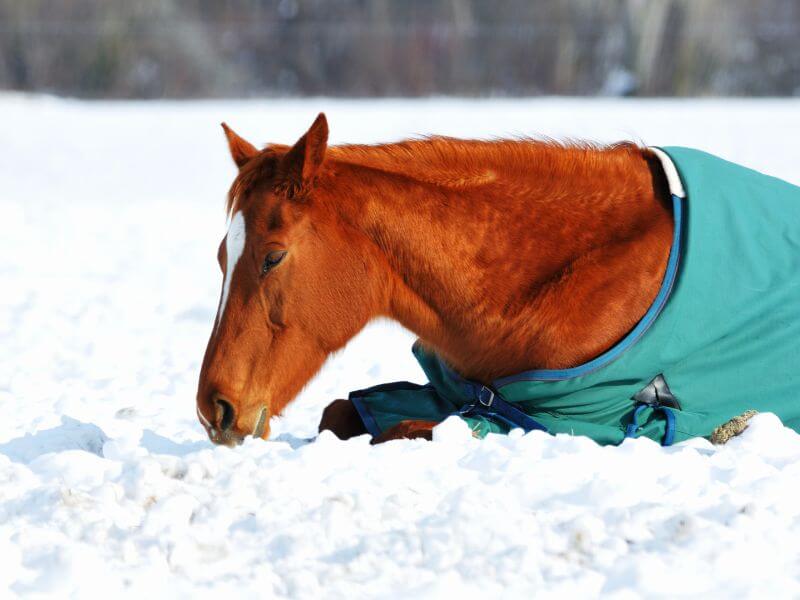
Sleeping Habits and Weather Conditions
When we talk about how horses sleep, we need to look at two key factors: sleeping habits and weather conditions. There’s a strong connection between these two that can help us understand horses better.
How Weather Affects Horse Sleep
- Weather Fronts and Windy Conditions: Have you ever felt extra alert when a big storm is coming? Horses are the same. When there’s a big weather front rolling in or if it’s really windy, horses may feel nervous and less likely to sleep deeply. They stay alert because they want to be ready if there’s danger.
- Ground Conditions: Where a horse chooses to sleep also depends a lot on the weather. They don’t like to lie down on muddy or gravel surfaces. Instead, they’ll look for comfortable, dry spots. If it’s a sunny day, that’s the best time for a horse to get some sleep. But, horses can still manage to sleep in winter as long as the sun is peeking out.
Sleeping Habits in Different Weather Conditions
Horses may change their sleeping habits depending on what the weather’s like.
- Cold, Snowy Days: Horses often spend less time lying down when it’s cold and snowy. They might prefer to stand or find some shelter to keep warm. But, every horse is different. Some might still like to stretch out and nap in the snow when it’s sunny.
- Warm, Sunny Days: On the other hand, when it’s a warm spring day, horses might lie down and sunbathe together. They’re not just catching some sun, they’re also watching out for each other’s safety.
- Cold Weather: When it gets cold, horses might sleep more at night instead of during the day.
Remember, every horse is different and will have its own preferred sleeping habits. It’s important to make sure they have a dry, sheltered place to lie down and sleep when they want to, like a run-in shed or a big stall. This helps them get the rest they need, no matter what the weather’s like.
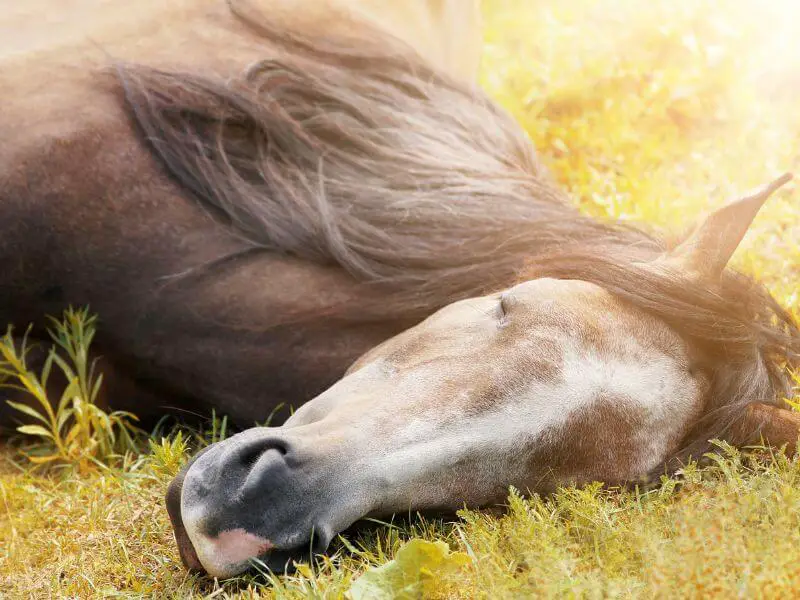
Unusual Sleeping Habits of Horses: Exploring the Unexpected
Horses are known for having unique routines, and their sleeping habits are quite remarkable. They differ from humans in their sleeping patterns, reactions during sleep, and even their choice of ‘sunbathing’. Here’s more on these interesting habits:
Horse Sleep Patterns: Short and Sweet
Unlike humans who typically sleep for a continuous period at night, horses have a different approach. Instead of one long sleep, they take several short naps throughout the day and night. It’s quite common to see a horse catching some quick shut-eye at almost any time.
Dreaming Horses: A Peek into their Sleep
Have you ever wondered if horses dream? Observations suggest they probably do! When horses enter a deep sleep stage, similar to our REM sleep, they display interesting behaviors. If you see a horse twitching their ears, moving their legs, or even flaring their nostrils during sleep, they might just be in the middle of a dream.
Horses In The Dark
Horses have remarkable vision that allows them to navigate their surroundings effectively, even in low light conditions. While they cannot see as well in complete darkness as animals like cats, they possess certain adaptations that aid their vision in dim lighting.
If you want to learn more about horses’ night vision and how they see in the dark, you can check out this informative blog post on the details of horse night vision and provides insights into their visual capabilities under different lighting conditions.
Sunbathing Horses: More Than Just Relaxation
Horses enjoy soaking up the sun just as much as we do, if not more. It’s quite a sight to see a group of horses basking in the sun together. While it’s a great relaxation method, sunbathing also serves a practical purpose. Some horses stand guard for the group, ensuring their safety while their pals enjoy the warmth.
Sleeping Positions in Different Weather
Just as weather affects where horses choose to sleep, it can also influence how they sleep. In colder, snowy conditions, horses might decide to stand while sleeping to keep warm. However, even on a chilly day, a sunny spell might invite them to lie down for a nap.
The Importance of Sleep for Horses
Good sleep is essential for everyone, including our equine friends. Not getting enough sleep, or experiencing disturbed sleep, can impact a horse’s energy levels and overall health. That’s why, as caretakers, we should strive to understand horse sleeping patterns and ensure they have a conducive environment for rest.
Keep in mind, each horse is unique, and their sleep habits can vary widely. The more we learn about these unique sleep behaviors, the better we can care for our horses, helping them lead healthier, happier lives.
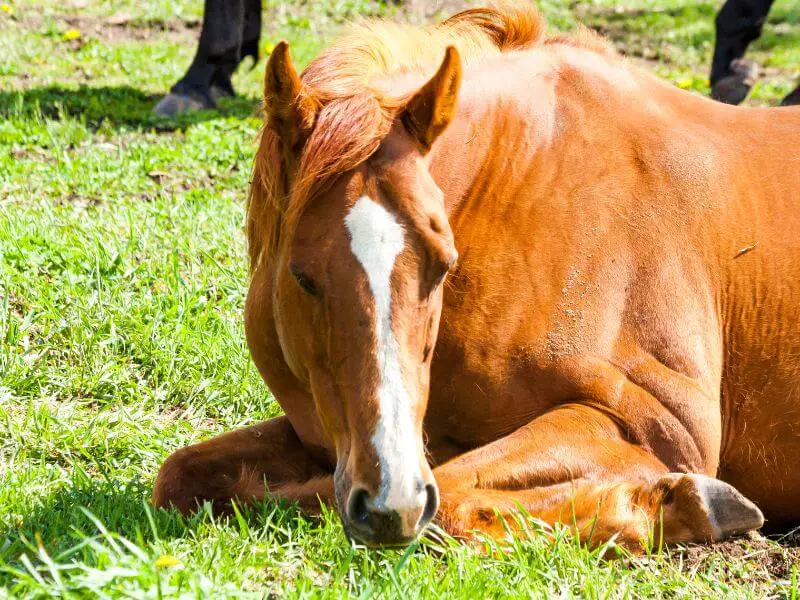
Promoting Better Sleep for Horses
When we talk about getting a good night’s sleep, we often think about ourselves. But guess what? Horses need good sleep, too! Just like us, horses need a cozy, quiet, and safe space to rest. This post will help you understand how to make sure your horse gets the best sleep possible.
Creating a Safe and Comfortable Sleep Environment
Let’s start with their sleeping spot. Here’s what you should keep in mind:
- Dry and Sheltered Area: Horses need a dry, cozy space to sleep. This could be a big stall or a run-in shed. Remember, a happy horse is a dry horse!
- Safety is Key: Make sure the area is safe. This means good, strong fences and as few disturbances as possible.
- Bedding Matters: Straw, shavings, or mats make a great bed for horses. These materials make sure the horse is comfortable when it lies down.
- Space to Stretch: Horses like to move around while they sleep. Make sure they have lots of room to stretch out and find a comfy position.
- Just Right Temperature: Horses don’t like it too hot or too cold. Keep the sleeping area well-ventilated in the summer and well-insulated in the winter.
Remember, every horse is different. Some might like one thing, others might like another. The key is to pay attention to what your horse prefers.
Potential Sleep Aids for Horses
Sometimes, horses might need a little extra help to sleep well. That’s where sleep aids or supplements come in. Here are a few options:
- Joint Supplements: These supplements, made with things like glucosamine, chondroitin sulfate, hyaluronic acid, and omega-3 fatty acids, help keep a horse’s joints healthy. This can make lying down and getting up easier.
- Nerve and Muscle Supplements: Some horses might feel anxious or stressed, which can make sleeping hard. Supplements like thiamine (B1), magnesium, taurine, and alpha-lactalbumin help keep their nerves and muscles working well.
Before giving any sleep aids or supplements, always ask a vet. They know what’s safe and what works best for each horse.
FAQs On Horse Sleep
Welcome to our FAQ section on horse sleep! Here, we have compiled some common questions and their answers to help you understand how horses sleep.
DO HORSES SLEEP AT NIGHT?
Yes, horses sleep at night, but they also sleep throughout the day. Unlike humans, horses take shorter naps at different times.
According to PetMD, a typical night for a horse involves grazing, snoozing while standing up, and short periods of lying flat out for deep sleep.
HOW MANY HOURS DO HORSES SLEEP IN A 24-HOUR PERIOD?
Horses need around 5-7 hours of sleep each day, including 30-60 minutes of deep REM sleep. They sleep in short spurts to stay alert and ready to react to any dangers in their environment.
CAN HORSES SLEEP WITH THEIR EYES OPEN?
Yes, horses can sleep with their eyes open. When they are in slow wave sleep, which is also known as standing sleep, they may not close their eyes completely.
They might even blink occasionally as they move in and out of alertness while dozing.
WHY DON’T HORSES LAY DOWN?
Horses do lie down, but it can be challenging to catch them in the act.
They only lie down to get their deep REM sleep when they feel comfortable in their environment, secure in their herd dynamics, and confident that other horses will keep watch while they sleep.
HOW DO HORSES LAY DOWN?
Horses have learned how to lie down and get back up easily, although it may not always look graceful.
Young foals may have a bit more trouble due to their long legs.
DO HORSES DREAM?
We’re not entirely sure, but it’s likely that horses dream. People and dogs dream during REM sleep, and horses exhibit dream-like behaviors too. Sometimes, horses may grunt, snore, or move their eyes rapidly back and forth under their eyelids while in REM sleep. Animal behaviorist McDonnell has even observed some horses moving their feet as if trotting in their dreams. However, what horses dream about remains a mystery.
HOW LONG DO HORSES SLEEP?
According to Kentucky Equine Research, horses need 5-7 hours of sleep per day to maintain optimal health. However, horses don’t sleep in one continuous block like humans do.
Instead, they take “power naps” throughout the day and night, lasting as little as 5-15 minutes at a time.
This sleep pattern developed as a survival mechanism to remain vigilant against predators.
HOW DO BABY HORSES SLEEP?
Baby horses, or foals, sleep more than adult horses. At birth, foals spend 50% of their daylight time sleeping, with approximately one-third of that time in a recumbent position.
As they grow, their sleep patterns gradually resemble those of adult horses.
The extended periods of sleep in a recumbent position are believed to be necessary for the assimilation of information obtained during their waking periods.
DOES WEATHER AFFECT HORSE SLEEP?
Yes, weather can influence how much and how well horses sleep. A significant weather front can make horses hesitant to let down their guard and sleep.
Windy conditions often make horses more alert and hyper. Ground conditions also play a role, as horses prefer not to sleep on muddy or gravel surfaces.
Sunny and temperate days are ideal for sleep, but as long as the sun is out, horses can still happily snooze during winter days.
HOW DO MINIATURE HORSES SLEEP?
Miniature horses sleep in a similar way to other horses, both standing and lying down in short spurts throughout the day and night.
Like their larger counterparts, miniature horses require both slow wave sleep while standing and deeper REM sleep while lying down to stay healthy.
DOES CRIBBING AFFECT SLEEP?
Cribbing, a behavior where a horse grabs objects with its teeth and sucks in air, can indeed affect a horse’s sleep quality and quantity.
Research suggests that cribbers tend to have less slow wave sleep compared to other horses, up to 48 percent less.
If you notice your horse engaging in cribbing, it’s essential to monitor their sleep patterns closely and consult with your veterinarian if any issues arise.
HOW LONG CAN A HORSE LAY DOWN SAFELY?
Horses typically sleep in short bursts throughout the day and night, ranging from five minutes to over an hour if undisturbed.
However, if you notice your horse spending excessive amounts of time sleeping during the day, it’s advisable to consult your veterinarian to rule out any potential sleep disorders, such as Hypersomnia.
WHAT OTHER ANIMALS SLEEP STANDING UP?
National Geographic, Most four-legged land herbivores, such as cows, moose, rhinos, bison, and horses, can doze lightly on their feet but need to lie down to enter deep sleep.
ARE THERE SLEEP AIDS FOR HORSES?
There are several ways to encourage better sleep in horses. Nutritionist Kathleen Crandell, PhD, from Kentucky Equine Research, recommends specific joint supplements that can make it easier for horses to lie down and get back up.
These supplements contain ingredients like glucosamine and chondroitin sulfate, hyaluronic acid, and omega-3 fatty acids, which support healthy joints, decrease discomfort, and potentially aid in recumbency and standing after REM sleep.
In addition, Kentucky Performance Products suggests managing inflammation, calming anxious horses, and adjusting the diet for optimal sleep.
Adding Omega-3 fatty acids can help reduce inflammation, while supplements like thiamine (B1), magnesium, taurine, and alpha-lactalbumin can promote healthy nerve and muscle functions.
Choosing feeds high in fat and fiber that are slowly metabolized can also help regulate glucose metabolism and limit hormone spikes.
Please note that the information provided in this FAQ section is for general informational purposes only. If you have specific concerns about your horse’s sleep or health, we recommend consulting with a veterinarian.
In the end, the most important thing is to make sure your horse feels safe and comfortable. By following these tips, you’re on your way to helping your horse get the best sleep possible. Sleep well, horse friends!
Cheers, Kacey
P.S. Did you like this article? Gallop over to:

